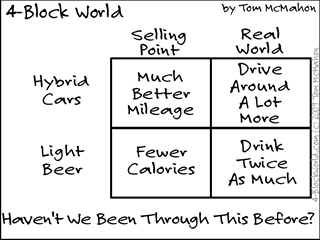It’s about time for us to get a new car to replace our one-and-only car, a venerable 1998 Toyota Corolla. But thanks to idiot politicians and their cash-for-clunkers program, now is a bad time to buy. Not only do we not get in on a cash-for-a-clunker deal, but we have to pay extra taxes so other people can trade in their clunkers. Not only that, but the people who ARE trading their clunkers in are causing shortages of new cars. It isn’t that we want a new car. We want a low-mileage used one. Just the same, this program is not going to drive prices down at the dealers. It isn’t going to motivate them to sharpen their pencils to sell to us.
On the other hand, I suppose if more people buy new cars instead of used, it might actually work a little bit in our favor if it causes a glut of used cars. But I expect the net result will be more to the dealers’ benefit than ours. The clunkers are going to the dumpster, and will not be going to the used car lots.
So it might be best for us to hang on to our car until just before the massive inflation that will be required to pay for all these stimulus programs starts to kick in. We’ll see.
In the meantime, the program probably does not a thing to motivate people to cut their carbon emissions. Having a fuel-efficient car does not motivate people to burn less fuel.
